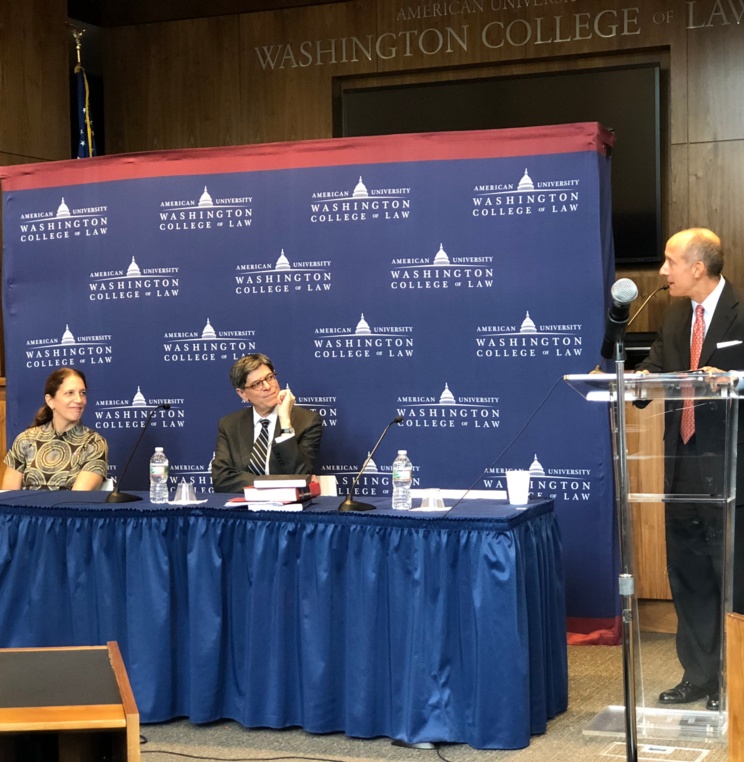Former Secretary Jack Lew Addresses “Ten Years After the Financial Crisis”
Oct. 10, 2018

American University Washington College of Law’s Business Law Program presented “Ten Years After the Financial Crisis,” a discussion with former Secretary of the Treasury Jack Lew, Wednesday, Oct. 10. The discussion, in which Lew addressed the economic and political legacy of the financial crisis and future economic challenges, was moderated by American University President Sylvia M. Burwell. Burwell was nominated by President Obama and confirmed by the Senate as Lew’s successor as Director of the Office of Management and Budget in 2013, and served alongside him as a cabinet secretary when she was Secretary of Health and Human Services from 2014-2017.
“We were thrilled when Secretary Lew accepted our invitation to speak to the Business Law Program,” said Professor David Snyder, the director of the program. “We were particularly delighted with the co-sponsorship from the Kogod School of Business and the School of Public Affairs. Secretary Lew has been at the center of policymaking and government exactly where business, law, and policy intersect, and there is no one better qualified to assess where we are now as well as the outlook for the next few years. And aside from his experience, Secretary Lew has a gift for conveying the big picture issues in a way that does not lose track of the nuances and details of the policy decisions.”
Lew also previously served as White House Chief of Staff and director of the Office of Management and Budget, and was principal domestic policy advisor to House Speaker Thomas P. O’Neill, Jr. He is currently a visiting professor of international and public affairs at Columbia University and a partner at Lindsay Goldberg.
In his introductory speech, Lew addressed current public distrust of the economic system, noting that “since the financial crisis there has been a broad erosion of respect for experts and facts.” Lew explained that Americans saw that few people or institutions were punished for the economic crisis and “with no high profile convictions, many simply concluded that our system was broken.”
Lew also discussed how he felt the country had yet to find the right balance following the mortgage crisis. “I think it’s a bad thing if people get into mortgages they can’t afford,” he said, “and it’s also bad if people who should be able to get mortgages can’t get them.”

Burwell took a moment to recognize the event as a wonderful example of a cross-campus partnership. She also acknowledged the recent scholarship and business law leadership of American University Washington College of Law faculty members Heather Hughes, Jonathan Baker (who also served in the Obama Administration as Chief Economist of the Federal Communications Commission from 2009-2011), and Snyder, who has directed the Business Law Program since 2008.
The event, attended by more than 80 students, faculty, and staff members, included a wide range of topics from the Fed to trade practices to economic regulations. And, during the Q&A session, Secretary Lew took questions from students, who asked how politics fit into the mix.
Stephanie Wald, a current 3L and Dean’s Fellow with the Business Law Program who helped plan the event, inquired about the growing federal deficit.
“Right now, left and right, I don’t see anyone that thinks there are any limits…that we can borrow forever,” Lew said. “I think the burden [of the deficit], when the day of reckoning comes, will fall on the most vulnerable. It’s really a small, small, small group of people on both sides that think we need to worry about it,” he said, stressing that the political payoff of working in a bi-partisan manner to lower the deficit is not great.
“It’s unlikely that we are going to see a balanced budget any time soon,” he said. However, Lew noted that a sustainable deficit, of about 3 percent of the GDP would be a step in the right direction.